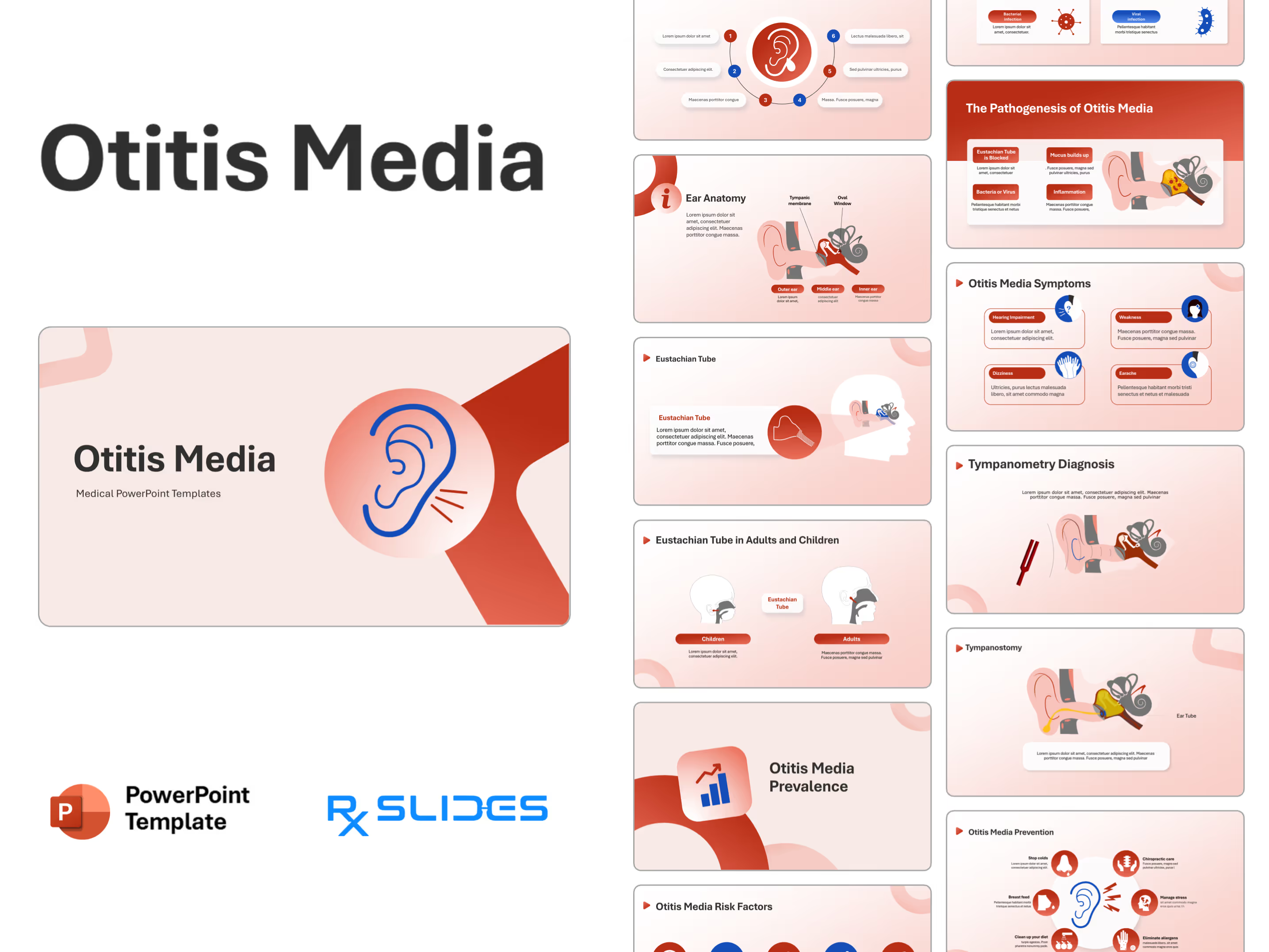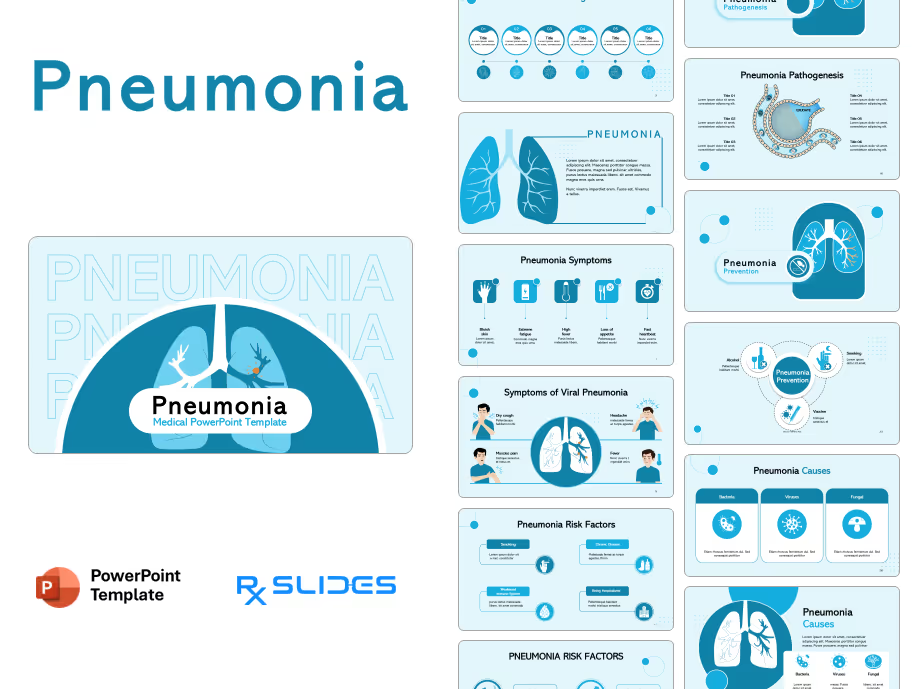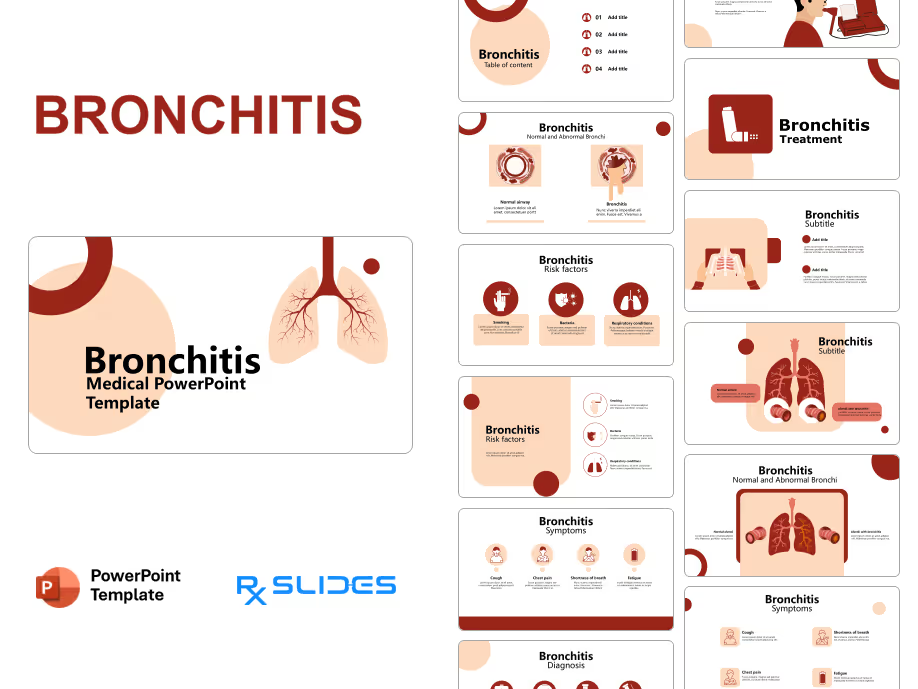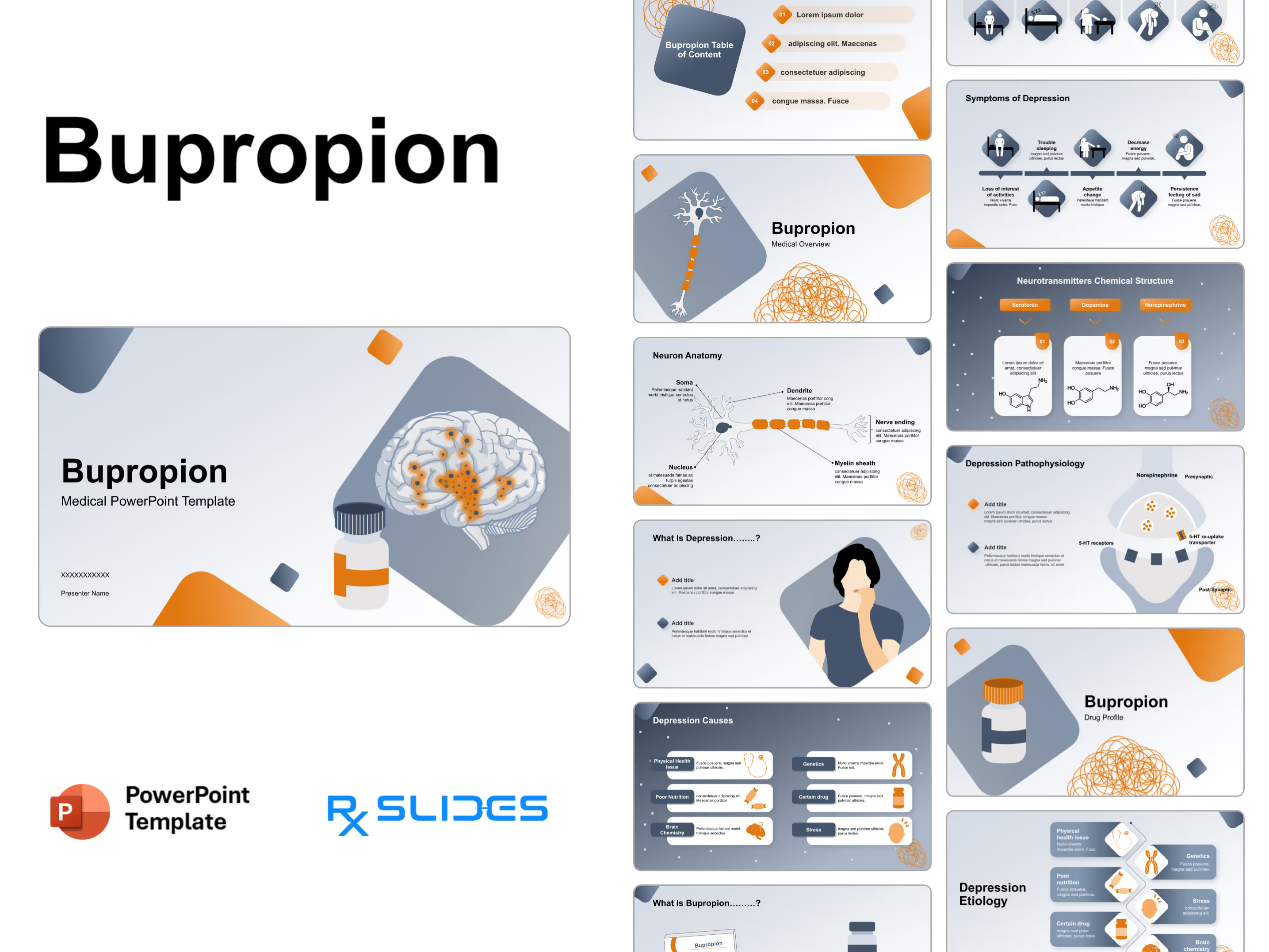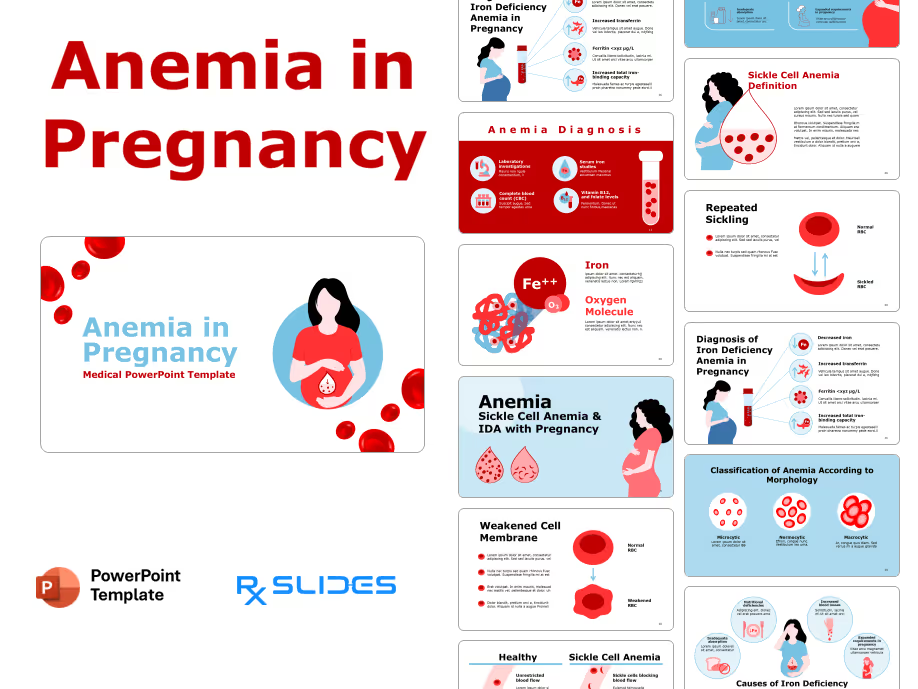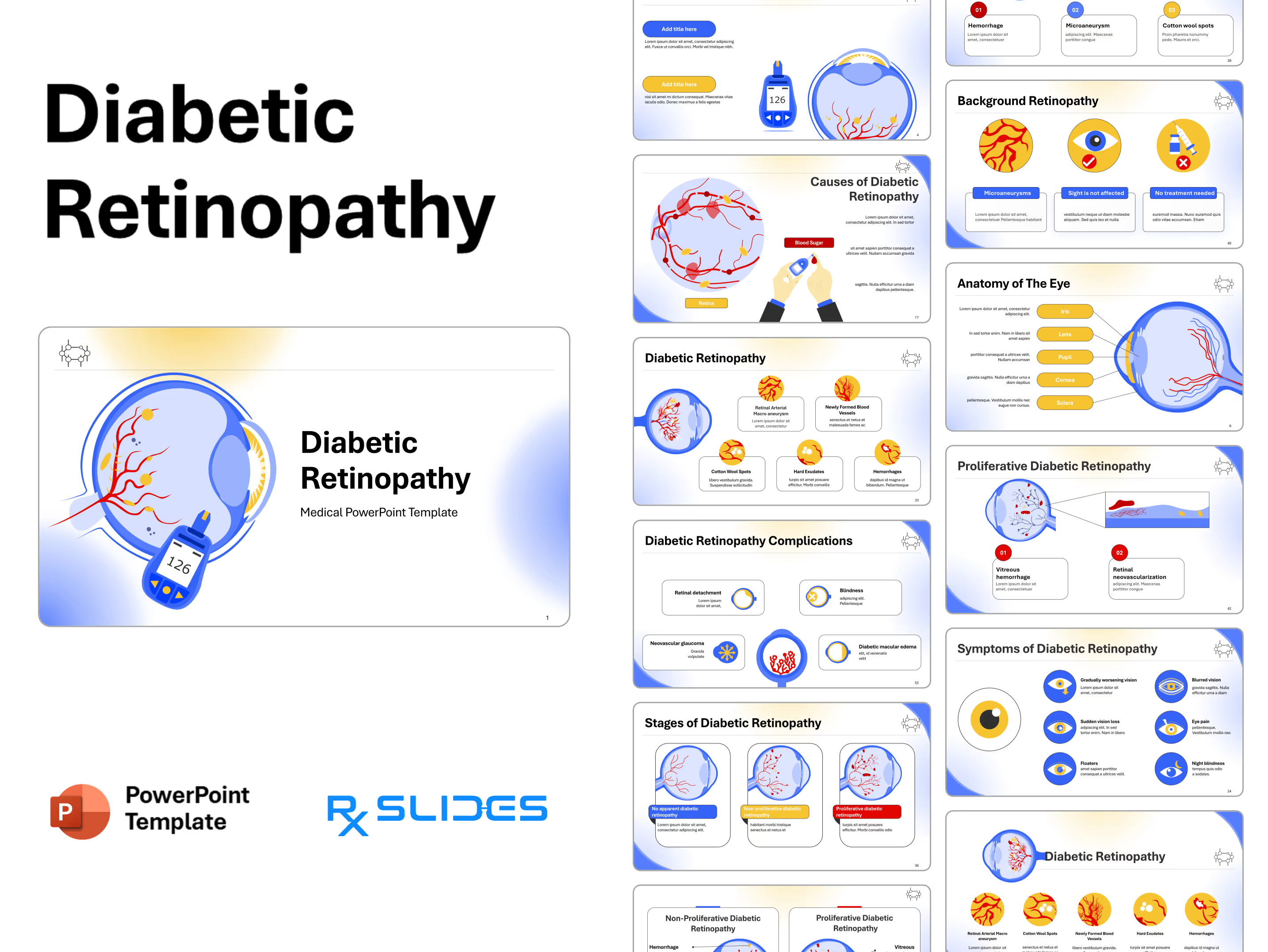Omeprazole PowerPoint Template

Omeprazole PPT: Medical PowerPoint Template
- The Omeprazole PPT template is a dynamic medical PowerPoint template that will help explore your topic effectively.
- Animated mechanisms: engaging animations that clarify complex processes.
- Customized template: Tailor the content and visuals to your specific needs, ensuring your presentation is proper to your audience.
- Editable content: Easily adapt the information to match your unique expertise and teaching style.
- Dynamic slides: Break free from static presentations with interactive elements that keep your audience engaged.
- RxSlides expertise: Trust the knowledge of medical professionals to create a template that is both accurate and impactful.
- You can preview the omeprazole PPT template in the next section to get the full experience.
Omeprazole PPT Template Content
- Nice looking cover slides to start your Omeprazole PPT presentation with.
.avif)
- Editable table of contents that will help you explain the contents of your omeprazole PPT presentation.
.avif)
Illustrations for definition, description and structure of omeprazole
Definition
- Omeprazole is a prodrug belonging to the class of proton pump inhibitors (PPIs). It irreversibly inhibits the H+/K+-ATPase enzyme in gastric parietal cells, leading to a profound and prolonged suppression of gastric acid secretion.
Structure
- Features a bicyclic imidazole core with a sulfinyl moiety responsible for its irreversible binding to the H+/K+-ATPase enzyme.
Description
- Available in various oral dosage forms: capsules, tablets and orally disintegrating tablets.
- Omeprazole is available in the market under the brand name (LOSEC) in different dosage forms and also in different brand names for different manufacturers.
- Capsules: 10mg, 20mg, 40mg.
- Chewable Tablets: 10mg, 20mg.
- Oral Suspension: 10mg/1mL packets.
- Oro dispersible Tablets: 20mg, 40mg.
Marketed under brand names like
- Prilosec produced by Procter & Gamble.
- Losec, produced by AstraZeneca.
- Zegerid produced by Santarus and Salix Pharmaceuticals.
- Omez produced by Dr. Reddy's Laboratories.
.avif)
Indications of omeprazole
- The indications of Omeprazole are visualized on the infographics, including (Duodenal and peptic ulcers caused by NSAIDs, Gastrointestinal reflux disease and Peptic ulcers caused by Helicobacter pylori).
.avif)
Contraindications of omeprazole
- A contraindication of Omeprazole is a hypersensitive reaction of the body against it.
.avif)
Pharmacodynamics of omeprazole
- The omeprazole pharmacodynamics slide explains how Omeprazole affects the diseased stomach and how it decreases the acid in the stomach.
Acid blocker
- Rapid & long-lasting reduction in stomach acid production.
- The maximum effect is within 2 hours and continues with daily dosing.
Serum gastrin boost
- Temporary rise in gastrin levels, in parallel with acid decrease.
.avif)
Animated mechanism of action of PPIs
Parietal cell machinery
- Carbonic Acid Formation: An animated illustration explains how the Intracellular metabolic processes generate water (H2O) and carbon dioxide (CO2), which react via carbonic anhydrase to form carbonic acid (H2CO3).
- Hydrochloric Acid Generation: dynamic animation explains that H2CO3 dissociates rapidly into bicarbonate (HCO3-) and a hydrogen proton (H+).
- Proton Pump Activation: An enzyme called the H+/K+-ATPase actively transports H+ out of the parietal cell lumen against a concentration gradient, utilizing adenosine triphosphate (ATP) as its energy source.
- Potassium/Chloride Exchange: This proton efflux generates an intracellular potassium (K+) gradient. Potassium channels facilitate K+ re-entry into the cell, while chloride (Cl-) exits through specific chloride channels in exchange for K+.
- Hydrochloric Acid Formation: animated illustrations show that H+ combines with Cl- to form hydrochloric acid (HCl), contributing to the highly acidic gastric environment.
Omeprazole's animated mechanism of action
- Target Specificity: Omeprazole is a prodrug requiring activation within the acidic parietal cell environment. It concentrates on the site of H+/K+-ATPase activity.
- Irreversible Binding: Activated omeprazole forms covalent bonds with cysteine residues on the H+/K+-ATPase enzyme, effectively deactivating it.
- Proton Pump Inhibition: With H+/K+-ATPase inactivated, proton expulsion ceases and HCl production drops sharply.
.avif)
Pharmacokinetics of omeprazole
- Omeprazole pharmacokinetics medical slides with animated charts and graphs visualize the pharmacometrics parameters.
- These parameters include (absorption, half-life, protein binding, metabolism and route of elimination).
Absorption
- An animated illustration explains that the drug is rapidly absorbed orally, with peak plasma concentrations within 0.5-3 hours. Bioavailability is low (~35%) due to extensive first-pass metabolism.
Distribution
- Low volume of distribution (0.3 L/kg), confined primarily to the extracellular fluid.
Metabolism
- Extensively metabolized in the liver, as illustrated, primarily via CYP2C19 and CYP3A4, forming inactive metabolites.
Elimination
- Elimination half-life is short (~0.5-1 hour), with almost complete clearance from plasma within 3-4 hours. Half-life time is visualized with a graph.
- Elimination primarily through renal and fecal routes, with minimal excretion of unchanged drug.
.avif)
Adverse effects of omeprazole
- Omeprazole adverse effects are explained with visuals of Headache, Vomiting, Abdominal pain, Constipation and Farting.
.avif)
Toxicity of omeprazole
- The carefully designed medical slides show insights into the toxicity of Omeprazole, including Headache, Drowsiness, Tachycardia, Blurred vision, Confusion, Nausea, Vomiting, Dry mouth and Diaphoresis.
- Medical infographics show the toxicity doses of the drug.
.avif)
Drug interaction
- Omeprazole interaction options are visualized and explained with charts, diagrams and medical icons, including:
- Interaction with amoxicillin, which may be fatal.
- Interaction with clarithromycin, which is an additive reaction.
- Interaction with CYP2C19 Substrates which competitively inhibits CYP2C19.
.avif)
RxSlides visuals for omeprazole PowerPoint presentation template
- A Set of PowerPoint icons and illustrations related to Omeprazole disease will help you customize the content of this 100% editable presentation according to your content and audience interest.
.avif)
Features of the Template
- 100% editable PowerPoint template.
- Editable colors, you can change according to your presentation style and company branding guidelines.








